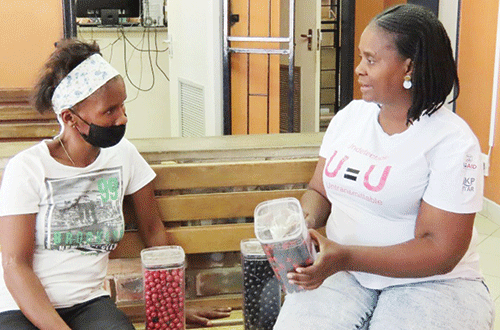With the double onslaught of being diagnosed with tuberculosis and HIV, Scholastica Goagoses (48) took the blow very hard, leading to the abuse of alcohol and not taking treatments seriously.
In 2007, she tested positive for HIV, and started taking drugs and drinking alcohol simultaneously.
When doctors put her on HIV treatment, she did not take her medication regularly, and her immune system started to weaken.
“My HIV-positive diagnosis was the most difficult news at the time due to limited information, stigma and discrimination associated with the disease. I feared dying, and started abusing alcohol and drugs. My body was weak, and I was also diagnosed with tuberculosis. In 2010, I weighed a mere 27 kg,” she recalled as she shared her story with the U.S. Embassy. Whenever Goagoses defaulted on taking her medication, she would change to a different health facility and pretend to be a first-time client, resulting in starting a new HIV treatment regime all over again. She said she did this to avoid the stigma and discrimination that patients fear when defaulting.
Namibia’s first case of HIV was reported in 1986, and over the years, the country has done tremendously well in managing the virus, with 98% of persons who are HIV positive knowing their status; 92% of them having been initiated on treatment and 93% of those who have been initiated on treatment being virally suppressed by the start of January 2023.
“My struggle to adhere to the treatment continued. I moved from one clinic to another, and always registered myself as a newly-diagnosed HIV patient,” said the Windhoek-bred quadragenarian.
This continued until she received the opportunity to become a Peer Educator on condition that she improves. A Peer Educator is a person who reaches out to other community members who live with or are affected by HIV to convince them to receive professional care and treatment.
Goagoses now works in Gobabis in the Omaheke region as Key Populations Strengthening Technical Assistance Response (KP-STAR) official. KP-STAR is a U.S. government-funded project which provides health and other crucial services in Namibia to people who are at risk of contracting HIV.
KP-STAR is funded by the U.S. President’s Emergency Plan for AIDS Relief (PEPFAR) through the United States Agency for International Development (USAID), and implemented by Intrahealth Namibia.
“In the end, I decided to change. I had to change not only to help my peers to take up HIV services, but also to help myself and gain control of my own life,” indicated Goagoses.
She narrated that it took her several weeks to contemplate whether she wanted to continue being who she was, or honestly change her life and start afresh.
Today, her role is to ensure that clients who test HIV-positive are receiving antiretroviral treatment (ART), becoming virally suppressed, and staying on their treatment.
She also ensures that clients who test HIV negative and are at high risk of acquiring HIV are getting Pre-Exposure Prophylaxis (PrEP) medication. PrEP reduces the risk of HIV infection significantly. She equally provides other health and social support services to those in need.
“Considering my defaulting history, I first had to evaluate myself. I took a very important step in my journey when I requested to be transferred from the Katutura Health Centre in Windhoek to the Epako Clinic in Gobabis. At that time, my viral load was very high, but with the support of the Epako Clinic staff and USAID’s KP-STAR project, I became a model HIV patient. I am now virally suppressed, and proud that I cannot transmit the virus to anyone,” stated Goagoses.
As a case manager, she is now more than ever committed to helping anyone, including people who may feel marginalised such as female sex workers living with HIV, to lead a happy, healthy, safe and fulfilled life. She currently manages 139 clients on ART, and 51 on PrEP.
“I enjoy my work a lot. Knowing that I have helped many people and made a difference in their lives is very satisfying,” she stated with a wide brim on her face.
The Omaheke Regional Coordinator for IntraHealth Namibia, Fayonce van Wyk, strongly believes that Goagoses’ openness about her HIV status makes it easier for her to carry out her work.
“Scholastica has received case management training from IntraHealth Namibia, and she is also a certified HIV Rapid Tester. She knows all her clients as well as their file numbers by heart, which shows the high level of commitment towards her work,” she noted.
Van Wyk went on to say that “Scholastica is a living testimony of how a single person can impact others to fully benefit from services provided by the Ministry of Health and Social Services, in collaboration with projects such as KP-STAR. She is also a good example of how to remain healthy and live positively with HIV”.
-psiririka@nepc.com.na


